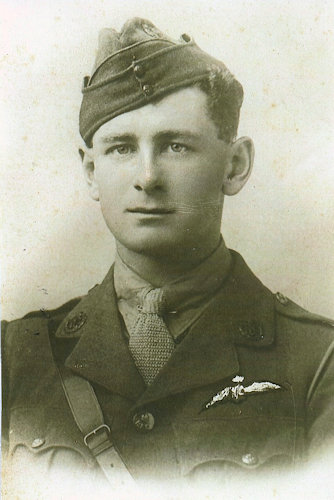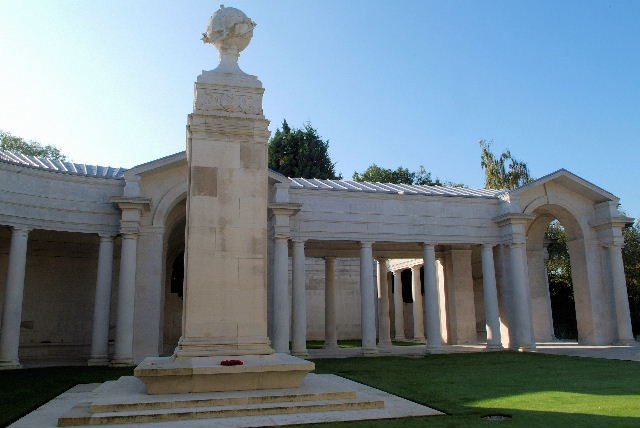Name
Henry Berners (Bernie) Begg
Conflict
First World War
Date of Death / Age
23/11/1916
23
Rank, Service Number & Service Details
Second Lieutenant
Royal Flying Corps
24th Squadron
Awards: Service Medals/Honour Awards
British War and Victory medals
Cemetery/Memorial: Name/Reference/Country
ARRAS FLYING SERVICES MEMORIAL
France
Headstone Inscription
NA
UK & Other Memorials
Watford Borough Roll of Honour,
St Andrew's Church Memorial, Watford
Pre War
Son of Henry Charles and Ida Rosalind Alice (nee SMITH) BEGG of Watford.
His parents married 18 April 1892 at St Paul’s Cathedral, Calcutta, India. Henry died 10 November 1950 in Watford aged 90, and was buried 14 November in North Watford Cemetery; Ida died 3 August 1953 in Watford aged 80, and was buried 7 July, also in North Watford Cemetery.
Henry was born 20 December 1893 in Calcutta, and baptised 9 February 1894 at St Paul’s Cathedral, Calcutta. He was educated at Dorset House, Littlehampton, Sussex, and Oundle (School House), Northants, from September 1907 to April 1913. After leaving Oundle he returned to Calcutta to join the firm of Begg, Dunlop and Co as an assistant. Later he acquired a knowledge of the jute industry in the firm's Alliance Jute Mills.
On the 1901 Census, it is assumed the family were still living in India. On the 1911 Census, aged 17 he was a pupil and boarder at School House, Oundle.
Wartime Service
He originally joined the Calcutta Light Horse 8 December 1913 as Trooper 1108: a merchant aged 20, 5’7″ tall. He was granted leave from the Corps 9 June 1916 for the duration of the war owing to his going to England to join the Army.
Bernie was working in India at the onset of World War 1. He returned to England in July 1916.
He served with the Royal Flying Corps from 1 August 1916 as Second Lieutenant, and as Flying Officer from 16 October 1916. He was sent to France to join 24 Squadron. after qualifying as a pilot, joined the British Expeditionary Force's Royal Flying Corps 24 Squadron under Commanding Officer Major Lanoe G. Hawker. Hawker, VC, DSO, at that time was a leading ace of the Corps.
Bernie wrote home to his parents In October 1916;
"My dear Father and Mother,
My last letter to you was written on Friday just before I went out on patrol. Well, I have just got home. At least I did so last night. My machine was going beautifully and I had just had a good fight with a Hun machine and had dived from 10,000 ft to 4,000 ft when bang went my engine and I was helpless. I managed to glide back to almost a mile and a half behind ‘no-man’s-land’ in a mass of British batteries and shell holes. My machine, of course, was badly damaged but I escaped without a shaking. My poor old machine landed with both wheels and its tail in separate shell holes. Of course, the batteries ceased fire till I was under cover.
A rather amusing incident was that I cut some telephone wires between the battery I was near and headquarters so that no order could come through to continue firing for some few minutes. This was in the afternoon and I spent the remainder of the day trying to telephone back to the aerodrome. I was in the area of another Army Corps and hence my message did not get through for some hours. The officers in the battery were my hosts and were very good to me. I spent the night in a dug-out. Early the next morning there was a long strafe which was very interesting to witness. By Jove, the Germans must have a rotten time when we all go together. Later on in the day I went to the nearest headquarters to telephone again, here I met a fellow called Raymond, who was the School House housemaster when Rivers was a prefect. He is a Staff-Captain and I had breakfast with the Staff, and the old General was very keen on stealing my long flying thigh boots! Later on, the tender trailer arrived and we had to take the machine to pieces. This could not all be done and carried down in the one day. So when it was dark I found a grand dug-out for the men and we got them a supply of food and then I came home to get a change of clothes. Next morning I motored back and, incidentally, took a heap of chocolates and cake etc up to the fellows at the battery. The machine was then packed up and I brought the whole party slowly home. An aeroplane traveling through the streets always causes a great sensation and this was no exception. One thing that pleased me immensely was that the men all thanked me for taking so much trouble in finding them a decent billet, and for the grub I supplied them with. I was jolly glad to get back.
Well now I must close. Love to all"
Yours Bernie
The 23rd November 1916 as reported missing during a scouting expedition in the area of Achet-le-Grande. It was a fateful day for both Bernie and Hawker. Bernie was initially reported missing after his De Havilland 2 scout plane was shot down by German Lt Dieter Collin over Morval in northern France during a scouting expedition. Later he was presumed to have been killed in action. This was Collin's first 'kill' the first of thirteen before he himself was killed in 1918. Hawker was killed and his plane shot down in a separate battle that same day by the notorious 'Red Baron', Manfred von Richthofen. Incidentally, von Rochthofen's rather macabre account of Hawker's downing seems to indicate that some aces considered dog fights as sort of 'tally-ho' personal duels among 'sportsmen' rather than a concerted war effort.
Bernie was later presumed to have been killed in action, flying a De Havilland DH2. His death was accepted for official purposes as having occurred on or since 23 November 1916; a report in German records states that he was shot down on 23 November 1916 at 11.20 am south-west of Baupaume. He was entitled to the Victory and British War medals.
His body was never found. He was twenty-three. His name is engraved on the RFC memorial in Arras, France.
Additional Information
There is an article about Henry in the West Herts and Watford Observer dated 4 August 1917.
His brother Rivers died 17 July 1917 and also features in this Roll of Honour
Acknowledgments
Sue Carter (Research) and Watford Museum (ROH on line via www.ourwatfordhistory.org.uk), Ian Begg, Paul Johnson



